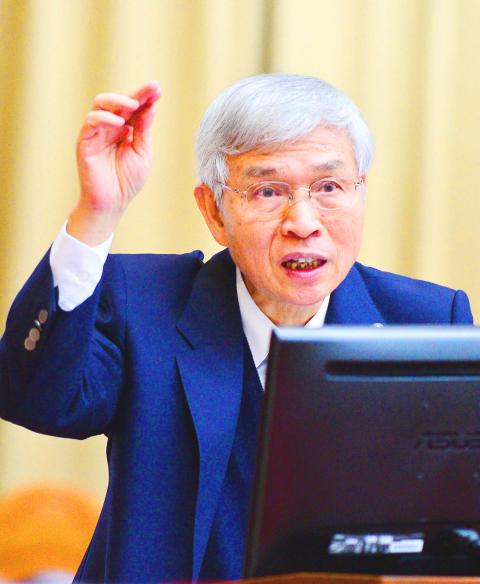Central bank Governor Yang Chin-long (楊金龍) yesterday said the bank would remove authoritarian icons from the nation’s currency if explicit orders were given by the transitional justice promotion committee to be established by the Executive Yuan.
Yang made the remark at a meeting of the Legislative Yuan’s Finance Committee, after Chinese Nationalist Party (KMT) Legislator Lai Shyh-bao (賴士葆) asked whether the passage of the Act on Promoting Transitional Justice (促進轉型正義條例) would prompt changes to the design of the nation’s currency.
Although the act was promulgated last year, the central bank cannot make changes before the transitional justice promotion committee specifies which banknotes or coins contain authoritarian imagery, Yang said.

Photo: Wang Yi-sung, Taipei Times
The act stipulates that the Cabinet is to create the nine-member transitional justice promotion committee to oversee the removal of authoritarian icons, the declassification of state archives and the rehabilitation of victims of persecution.
The committee is to be disbanded upon completing a full report on those tasks, the act says.
“Should the transitional justice promotion committee order a change to the design of the New Taiwan dollar, I believe we will have to discharge our duties according to the law,” Yang said.
Lai then asked Yang whether his comments could be interpreted as an unwillingness to follow the policy of his predecessor, former central bank governor Perng Fai-nan (彭淮南).
Lai also asked Yang whether he agrees that changing the design of the currency — which Lai said would cost NT$50 billion (US$1.7 billion) — would be a waste of taxpayer money for political purposes.
Yang responded to both questions in the negative, saying that the central bank decided during Peng’s tenure as governor that it would not change clearly apolitical and nonauthoritarian design elements of the currency.
In response to a question by Democratic Progressive Party (DPP) Legislator Liu Chien-kuo (劉建國), Yang said that the central bank does not currently have, or has ever had, a fixed limit on the upward movement of the NT dollar versus the US dollar.
Monetary policy observers have long called the exchange rate of NT$28.5 per US dollar the “Perng Fai-nan Line,” Li said, before asking Yang where he would draw the line on the NT dollar’s appreciation.
“I have followed Perng for a long time and I have never heard him say that we should hold this or that line in defense of our currency’s exchange rate,” Yang said.
The central bank would intervene and keep order if and when abnormal fluctuations occur in the market, he added.
Trying to reverse significant exchange rate fluctuations by force is counterproductive, Yang said, adding that the central bank favors a flexible approach to monetary policy.
The market yesterday appeared to respond to Lai’s comments by testing the central bank’s bottom line, with the NT dollar appreciating NT$0.057 to NT$29.200, its highest level since Jan. 31, when it reached NT$29.150.
The NT dollar yesterday opened at NT$29.245, moving between NT$29.180 and NT$29.250 before the close.

Right-wing political scientist Laura Fernandez on Sunday won Costa Rica’s presidential election by a landslide, after promising to crack down on rising violence linked to the cocaine trade. Fernandez’s nearest rival, economist Alvaro Ramos, conceded defeat as results showed the ruling party far exceeding the threshold of 40 percent needed to avoid a runoff. With 94 percent of polling stations counted, the political heir of outgoing Costa Rican President Rodrigo Chaves had captured 48.3 percent of the vote compared with Ramos’ 33.4 percent, the Supreme Electoral Tribunal said. As soon as the first results were announced, members of Fernandez’s Sovereign People’s Party

MORE RESPONSIBILITY: Draftees would be expected to fight alongside professional soldiers, likely requiring the transformation of some training brigades into combat units The armed forces are to start incorporating new conscripts into combined arms brigades this year to enhance combat readiness, the Executive Yuan’s latest policy report said. The new policy would affect Taiwanese men entering the military for their compulsory service, which was extended to one year under reforms by then-president Tsai Ing-wen (蔡英文) in 2022. The conscripts would be trained to operate machine guns, uncrewed aerial vehicles, anti-tank guided missile launchers and Stinger air defense systems, the report said, adding that the basic training would be lengthened to eight weeks. After basic training, conscripts would be sorted into infantry battalions that would take

EMERGING FIELDS: The Chinese president said that the two countries would explore cooperation in green technology, the digital economy and artificial intelligence Chinese President Xi Jinping (習近平) yesterday called for an “equal and orderly multipolar world” in the face of “unilateral bullying,” in an apparent jab at the US. Xi was speaking during talks in Beijing with Uruguayan President Yamandu Orsi, the first South American leader to visit China since US special forces captured then-Venezuelan president Nicolas Maduro last month — an operation that Beijing condemned as a violation of sovereignty. Orsi follows a slew of leaders to have visited China seeking to boost ties with the world’s second-largest economy to hedge against US President Donald Trump’s increasingly unpredictable administration. “The international situation is fraught

GROWING AMBITIONS: The scale and tempo of the operations show that the Strait has become the core theater for China to expand its security interests, the report said Chinese military aircraft incursions around Taiwan have surged nearly 15-fold over the past five years, according to a report released yesterday by the Democratic Progressive Party’s (DPP) Department of China Affairs. Sorties in the Taiwan Strait were previously irregular, totaling 380 in 2020, but have since evolved into routine operations, the report showed. “This demonstrates that the Taiwan Strait has become both the starting point and testing ground for Beijing’s expansionist ambitions,” it said. Driven by military expansionism, China is systematically pursuing actions aimed at altering the regional “status quo,” the department said, adding that Taiwan represents the most critical link in China’s